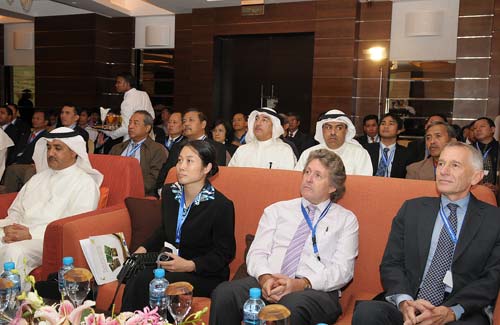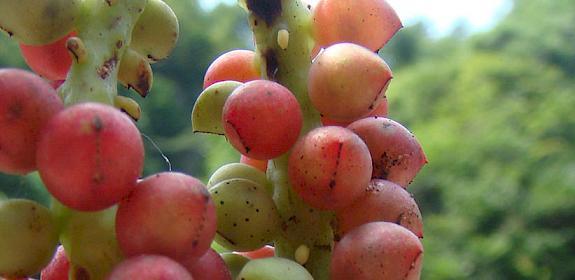Sustainability at heart of agarwood talks
Kuwait, October 2011—68 participants from 18 key producer and consumer countries of agarwood met last week in Kuwait to discuss the future of the ancient trade in this highly prized commodity.

Agarwood is the common name for the dark aromatic deposits of resin produced in the heartwood of Aquilaria and some species of Gyrinops trees (large evergreens native to several countries from north-east India eastwards through south-east Asia and southern China), in response to wounding or penetration of the tree and infection by a mould.
Agarwood has been used for centuries as highly-prized perfume, incense and traditional medicine across Asia and the Middle East.
The valuable product is known by a variety of names including Gaharu in Malaysia and Indonesia, Oudh in the Middle East, and as eaglewood and aloeswood.
Whole trees are normally felled to find the valuable resin deposits, but with just 10% of trees naturally infected this is a very inefficient process.
Recently published TRAFFIC research has demonstrated how rising demand for agarwood, problems in monitoring harvests and a persistent illegal trade threaten the future of the highly prized fragrant wood.
“The workshop was a timely response to a looming agarwood crisis, which could lead to rising illegal and unsustainable harvesting of Aquilaria trees in Asia, and threaten the supplies of this commodity, which is integral to the culture of the Middle East,” said Noorainie Awang Anak, Senior Programme Officer with TRAFFIC Southeast Asia, who attended the meeting in Kuwait.
Legal international trade in agarwood is regulated through a system of permits by the Convention on International Trade in Endangered Species of Wild Fauna and Flora (CITES), but illegal and/or unsustainable trade is placing a burden on continuing supplies of agarwood.
The meeting in Kuwait aimed to improve the implementation of CITES regulations to ensure the legality and sustainability of the agarwood trade.
Hundreds of tonnes of agarwood are traded each year, involving at least 18 countries, but over-exploitation of old-growth trees has led to a reduction in the quality and quantity of agarwood available.
Growth in the population and affluence of consuming markets in Japan, Taiwan, Saudi Arabia, and the United Arab Emirates (UAE) has seen demand soar over the past 30 years leading to diminishing stocks in the wild, rising prices and concerns over future supplies.
There has also been a rise in illegal trade—earlier this week, The Star reported how a foreign syndicate operating in Malaysia was suspected of illegally felling up to seven trees a night over the last four years in the forest reserves of Bukit Mertajam and Bukit Panchor, looking for agarwood.
Seven of the 18 agarwood-producing tree species found in Malaysia are at risk of global extinction.
Recommendations from the Kuwait meeting participants included a review of how assessments of ‘safe levels’ of trade in agarwood species are determined through the existing CITES ‘non-detriment findings’ (NDF) process.
Participants noted that the FairWild Standard on sustainable collection of wild plant materials could help inform this debate.
Participants also made recommendations on better monitoring of current levels of agarwood trade, including clarification on customs codes, registration of nurseries, plantations and agarwood traders, more readily available identification materials for enforcement officers, and determining levels and quantities of agarwood that can be carried as personal effects.
“By engaging directly with key trading partners in Asia, authorities in the Middle East can address regulation and enforcement issues and help ensure the long-term sustainability and legality of the agarwood trade,” said Awang Anak.



